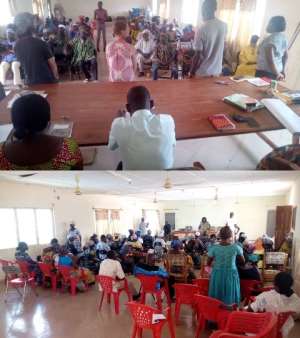
Garu (U/E), June 21, GNA - Stakeholders at a two-day forum at Garu in the Upper East Region have pledged to help address challenges confronting women in agriculture.
Constraints which include women's inability to access and control land, lack of farm inputs such as fertilizer, certified seeds, credit facilities and marketing of farm produce were identified as solvable challenges that could relieve women to be productive.
The forum, organised by CARE International, brought together landowners, chiefs, assembly members, technocrats, officials from the Ministry of Food and Agriculture (MoFA) and women leaders from communities in the Garu area to address the constraints confronting women in agriculture in the Garu-Tempane District of the Upper East Region.
The stakeholders, particularly the chiefs and landowners, pledged to ensure that women seeking to go into farming were given access to fertile land and supported to form formidable groups to enable them to access farm inputs such as fertilizer, certified seeds, and credit facilities.
The forum, which attracted 65 participants from 36 communities in the District, aimed at enhancing the ability of women farmers to work with strategic actors in the District to address their needs and provide detailed plans to advance the activities of rural women.
Ms Gladys Atia, the Gender Adviser of CARE International, speaking at the forum, said the organisation had been working in the District for the past five years to empower women economically such as advocating for fertile land for women farmers which had led to improvement in their livelihoods and families.
She said the organisation had support from a number of funding agencies including the Bill and Melinda Gates Foundation, Margaret Cargill Foundation, Jeffrey Peierls, and Coca-Cola Foundation.
She commended the chiefs and the landowners for providing land to the smallholder farmers in the area and stressed the need for more fertile lands to be released to the women to increase agriculture production.
Ms Atia said the Sustainable Development Goals (SDGs) was to reduce hunger and poverty and that could only be achieved if more women were empowered and supported in their farming activities.
The forum indicated that most women sometimes hired lands from landowners including their husbands to enable them to farm.
They were in some cases compelled to finish farming on their husbands' farms before they could attend to theirs, thereby negatively affecting productivity.
GNA
By Samuel Akapule, GNA




 TUC tells informal sector employers to pay their employees the minimum wage
TUC tells informal sector employers to pay their employees the minimum wage
 Prof. Marfo urges good civilian-security relations to promote peace
Prof. Marfo urges good civilian-security relations to promote peace
 I was nearly jailed because of NPP; I’m still ‘pained’ — Hopeson Adorye
I was nearly jailed because of NPP; I’m still ‘pained’ — Hopeson Adorye
 Rising against NPP after being a minister for 15 years is a sin; God will judge ...
Rising against NPP after being a minister for 15 years is a sin; God will judge ...
 Cecilia Dapaah: Reasons behind AG’s advice to EOCO not grounded in law – Martin ...
Cecilia Dapaah: Reasons behind AG’s advice to EOCO not grounded in law – Martin ...
 NPP should have reported Kingsley Nyarko’s conduct to police – Inusah Fuseini
NPP should have reported Kingsley Nyarko’s conduct to police – Inusah Fuseini
 Akufo-Addo cuts sod for MIIF Technical Training Centre
Akufo-Addo cuts sod for MIIF Technical Training Centre
 NPP didn’t struggle to win Ejisu by-election – Samuel Ayeh-Paye
NPP didn’t struggle to win Ejisu by-election – Samuel Ayeh-Paye
 A/R: Achiase Chief arrested for acid attack on community members
A/R: Achiase Chief arrested for acid attack on community members
 Naa Ayemoede returns to school
Naa Ayemoede returns to school
